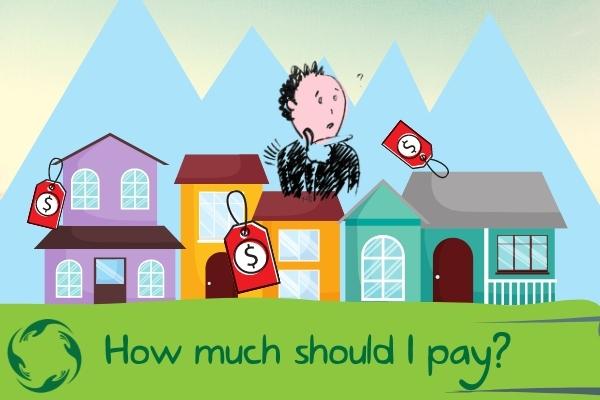How do you work out property value?
The only time you really know the value of a property is when a willing buyer makes an offer that the vendor (current owner) is willing to accept.
How does a vendor know what to accept?
We all like to think that our home is worth heaps. And if we are to believe media hype, the property values have been going up so our home must be worth a mint. Oh wait, the media is now reporting property values are plummeting… but that is other people’s properties mine is still worth heaps!
Purchasers want to pay as little as possible.
TRUE! But in a rising market you may need to pay a little more than you want to buy the property if there is a lot of competition. In a buyers market, where property values are not rising or the property values are dropping (which is where we appear to be heading at the moment), there is less competition for purchasing a property and there are lots of properties coming into the market. PLEASE NOTE: different regions (and even suburbs at times) have different property cycles. So while Auckland values may drop 10%, Christchurch properties may at the same time be increasing in value.
Right, let’s look at the tools that can help us to decide what the property value is, and what to offer as well as what we should think is reasonable to accept.
OneRoof is a useful site, you can enter the street address of the property you are investigating and it will give you some indicative house prices. Same goes for homes.co.nz. Even Realestate.co.nz has indicative values with the property listings.
The city council or district council property search site will give you the council valuation which is an indicative figure the council uses to determine what your rates will be. The council values are set every 3 years and so the property values can be wildly out in a rising market, which is good because your rates bill is lower, but not necessarily great if you want people to think your property is worth more. The council valuation may also be called the rateable value. We will talk another day about how the councils determine the rating values.
Ok so OneRoof and Homes think the property is worth around $680,000. But if as a purchaser you can only get finance of $660,000, to you the house is worth $660k. When you go to confirm your finance the bank will lend you either the agreed Sale & Purchase price or the Registered Valuation, whichever is less. A registered valuation must be provided by an independent qualified Registered Valuer. Your Mortgage Adviser will need to use a “Panel Valuer” through Corelogic or Valocity to order the valuation for the bank so that the bank knows that the valuer is independently selected. A “panel valuer” is someone who the banks have on their list of approved valuers, so this needs to be checked before a valuer is engaged. Pretty frustrating to get an independent valuation and then have the bank refuse it!
So, coming back to how much should you pay for the property. You should only pay for a property what you are prepared to pay (both financially and emotionally).
Once you have purchased the property the value is only relevant to determine if you receive the special interest rates (if you are borrowing less than 80% of the value of the property you qualify for special rates) or if you wish to access additional equity to be able to perform renovations, or access funds for other reasons. The only other time a rising, stable or falling property market will affect you is if you are attempting to sell the property. If you have owned the property during a rising market then you will be able to sell the property for more than you purchased it, but if you have not owned a property for very long and the property values are dropping or even stable you may not be able to get back what you purchased the property for – especially after you have paid the real estate agent fees.
Whatever you pay for a property, the important thing is to make sure you can afford the payments and that your budget can afford rising interest rates.
Work to repay the debt as quickly as possible to reduce your interest costs and to build equity in the property. Be comfortable with the amount you offer and be prepared to walk away from the deal if the Vendor is not willing to accept what you are willing to pay. It’s hard to walk away from a property you love, but it’s better than finding yourself crippled by repayments that you can’t afford.
As always, get in touch with us if you are thinking of buying, we can help you through the processes and provide access to many tools and lenders. Our goal as Financial Advisers is to see you get the debt repaid as quickly as possible.
We’re working with you to get the most out of your money, rather than just doing as the bank recommends and paying all that extra interest over the term of your loan.


